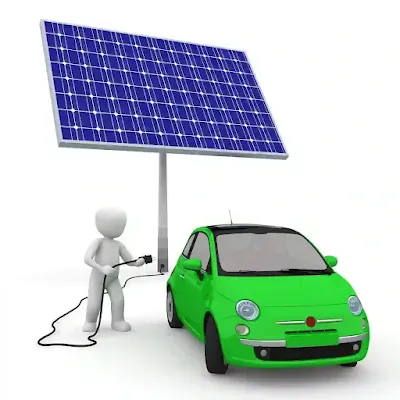A 120V solar setup can charge an electric car in about 16 hours. A 240V solar panel can do it in about 8 hours, and a 480V solar panel can fill up a battery in about 4 hours. These are rough estimates; the actual time will vary depending on the circumstance.
This article dives into the details of how long it takes to charge an electric car with solar panels. We’ll cover the different types of solar panels, their charging speeds, and the factors that can affect charging times.
How Do Solar Panels Charge Electric Cars?
Solar panels can charge electric cars by converting sunlight into electricity. They’re made up of a series of solar cells connected to a panel. When the sun shines on the solar cells, they create an electrical current. This current is then converted into direct current (DC).
However, there is a good reason why solar power is not the go-to option for charging electric vehicles. Solar panels are only effective when the sun is shining, so they can’t be used at night or on cloudy days. Even on sunny days, solar panels don’t always produce enough power to charge an electric car battery in a reasonable amount of time.
Also, installing enough solar panels to charge an electric car takes a lot of space. The average solar panel is about four feet (1.22 meters) by two feet (0.61 meters), and it takes about 20 square feet (6.1 square meters) of panels to generate 1 kilowatt (kW) of power. That’s a lot of rooftop real estate!
Of course, you can’t mount enough solar panels on a car itself to fully charge the vehicle. This means you must mount the setup on your home or lot and charge the EV just like you would with grid power.
EV Charging Times With Solar Panels at Different Voltages
Here’s the thing: Solar panels come in a variety of voltages, and each voltage has its own charging time. For example, a 120V solar setup will not charge at the same rate as a 240V or 480V setup.
The lower the voltage, the longer it will take to charge an electric car. That’s because there is less power flowing through the system.
Here are some rough estimates for how long it would take to charge an electric car with different voltages:
- 120V: 16 hours
- 240V: 8 hours
- 480V: 4 hours
Factors That Affect Charging Times
Now that we’ve covered the basics of solar panel charging times, let’s dive into some factors that can affect those times.
- The size of the solar panel. The size of the solar panel is one of the biggest factors that will affect charging times. A larger solar panel can collect more sunlight, which means it can produce more power. That means it can charge an electric car faster.
- The efficiency of the solar panel. Solar panel efficiency is another big factor to consider. A higher-efficiency solar panel can convert more sunlight into electricity, which means it can charge an electric car faster.
- The size of the battery. The size of the electric car battery is also a factor to consider. A larger battery will take longer to charge than a smaller battery. That’s because you’ll need more energy to fill up the larger battery.
- The climate. The climate can also affect charging times. In general, you want to charge an electric car in a sunny climate rather than in a cloudy one. That’s because solar panels need direct sunlight to work effectively.
- The car’s charging system. The car’s charging system can also affect the rate of charge. Some electric vehicles have onboard chargers that are more powerful than others. Others can be plugged into higher-voltage charging systems, which can charge the battery faster.
Tips for EV Owners Who Want To Use Solar Power
You have a lot to consider when looking to charge your EV with solar energy. Luckily, I have some tips that will make the process easier.
- Get a solar assessment. The first step is to get a solar assessment from a reputable company. This will help you understand how much sunlight hits your home and how much space you have for solar panels. The assessment will help you determine whether solar is a good option for you.
- Keep in mind that 1kWh of solar power is not equal to 1kWh of grid power. When comparing solar power to grid power, it’s important to remember that solar panels are less efficient than the grid. So, you need more solar power to generate the same amount of electricity. Ideally, you will lose 10% to 30% of energy when using solar power to charge your car. If your car requires 10 kWh of electricity to charge, you will need 11 kWh to 13 kWh of solar energy.
- Go for the 3-phase solar setup. A 3-phase solar setup is the most efficient way to charge an electric car. That’s because it allows you to charge at a higher voltage, which means you can juice your car faster.
- Consider adding battery storage. Adding battery storage to your solar system can also help you charge your car even when the sun is not out. You can store solar power in the battery and use it to charge your vehicle.
Final Thoughts
If you’re looking to save the environment by going solar, consider your charging times. It might not be as quick as you might want, but a 3-phase solar plant can help reduce charging time.
Overall, there are many things to consider when you’re thinking about using solar panels to charge your electric car. If you take the time to do your research, you can find a setup that will work for you.


